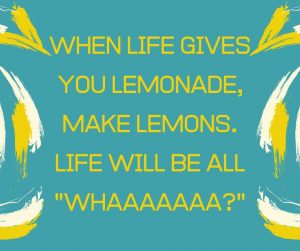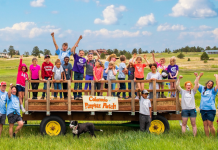Dear Facebook,
I’m not going to post one thing I’m thankful for every day until Thanksgiving. Mostly because I seriously don’t need one more thing on my to-do list. But also because it rings hollow to me, not to mention a little ego-centric, and not entirely genuine.
I get it.
Being intentionally grateful is probably a great practice, in theory. But I’m not sure waking up and looking around and posting, “I’m so thankful for the changing leaves,” is really what moves the needle on gratitude. Don’t get me wrong — going to see the changing aspens is one of my favorite fall activities. But it’s terribly easy to be grateful for the simple things.
Instead of regurgitating platitudes like, “Have an Attitude of Gratitude!” or “Count your Blessings!” I want to talk about gratitude as a legitimate tool of self-preservation.
For me, gratitude during the really perfect times feels forced – and even a little scary. It’s like if I stop in the middle of a perfect day and think about how fortunate I am, I may well be tempting fate. Maybe that’s my anxiety horning in. Regardless, those idealistic moments aren’t the times when I feel the impact of gratitude.
Glimmers of Gratitude
A series of recent events in my life have revealed gratitude at the most unlikely of times.
Most strikingly, it happened directly after a scary diagnosis of potential rheumatoid arthritis. RA, for those who haven’t spent the last three weeks scouring WebMD like I have, is a chronic autoimmune condition where a person’s immune system attacks its own joints. For me, it was my hip and shoulder. Most of the damage is irreversible, so if it is RA, I have to bid adieu to my women’s soccer team, my crossfit membership and even the occasional 5K. I will be medicated for the rest of my life. Rheumatoid arthritis can, but doesn’t always, take 12-15 years off a person’s lifespan.
So where and why would gratitude ever enter the picture?
Well, internet researcher that I am, I learned that rheumatoid arthritis makes pregnancy extremely complicated—if not impossible. And for whatever reason (God, the universe or whatever you believe), reading that struck me hard. I have my babies. I have also probably always had RA. But the fact that it held off causing problems until well after pregnancy made me take a deep breath.
Increasing Returns
That glimmer then seemed to attract further luster. My new husband came home having thoroughly researched the condition in the hours since my tearful post-diagnosis call.
“Babe, even if the worst happens, you have your brain. You can still be a famous writer. If we only have 70 years, they’ll be the best 70 years ever.”
Ugh. Pause for tears.
The next day, I somehow got an appointment to see a top rheumatologist. The specialty is sought after, with over 1.3 million people in our country suffering with RA, lupus, fibromyalgia and other autoimmune conditions.
The hip specialist who diagnosed me sent his PA to personally drive my imaging disks over to the rheumatology clinic with a referral, to ensure they received them in time. And the rheumatologist also specializes in a new stem-cell-like therapy that has had excellent results for people like me, who aren’t super excited about a hip replacement at 43.
That’s all pretty dang fortunate.
Gratitude When It Matters
So with a month of crappy news, why did I choose to write about gratitude this month? I guess it’s because gratitude is not about being thankful when things are great. That’s easy. Rather, gratitude is most helpful during the really tough times.
More, gratitude is not an outward facing thing, nor is it an obligation. 
That’s more of a social media #humblebrag – an exacerbation of the falsehood of the perfect Facebook life. It’s not about being forced to say what you’re thankful for at an awkward family Thanksgiving prayer.
Gratitude is, in my mind at least, a tool for self-preservation. A survival instinct. It’s about being open to recognizing the little blessings – the lifelines, if you will – that come most often when we’re floundering on the precipice of disaster or devastation. At least that is what it is for me. And I’m grateful for the lifeline that is – well – gratitude.














